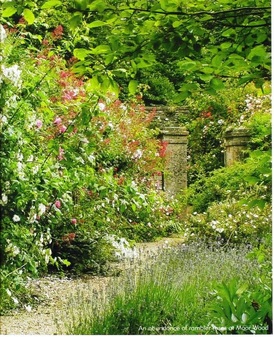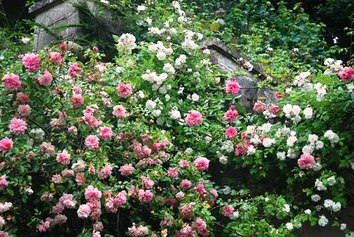
Rambler Roses
The National Collection began at Moor Wood in 1983, and has progressively been added to. The idea was to collect all the known varieties of each species, before they were lost to gardens and gardeners. There are over 600 National Collections under the umbrella of the Plant Heritage, ranging from daisies to beech trees. National Collections were just getting off the ground in the early 80's when Henry offered to collect ramblers, they seemed to fit with the wild and rather romantic effect Henry and Susie thought they could create in the garden. There are now over 150 varieties of rambler in the garden and around the grounds as well as many other varieties of rose.
Over the years of trying to collect all varieties of rambler rose invariably challenges presented themselves, invariably, there are some roses that are scarce because they are simply less resilient; others are gems and amply repay the search. None of the roses in the garden are sprayed, all make do with a barrow load of manure in the winter, which not only feeds them but also suppresses the disease spores from the previous year.
The National Collection began at Moor Wood in 1983, and has progressively been added to. The idea was to collect all the known varieties of each species, before they were lost to gardens and gardeners. There are over 600 National Collections under the umbrella of the Plant Heritage, ranging from daisies to beech trees. National Collections were just getting off the ground in the early 80's when Henry offered to collect ramblers, they seemed to fit with the wild and rather romantic effect Henry and Susie thought they could create in the garden. There are now over 150 varieties of rambler in the garden and around the grounds as well as many other varieties of rose.
Over the years of trying to collect all varieties of rambler rose invariably challenges presented themselves, invariably, there are some roses that are scarce because they are simply less resilient; others are gems and amply repay the search. None of the roses in the garden are sprayed, all make do with a barrow load of manure in the winter, which not only feeds them but also suppresses the disease spores from the previous year.

Charities
All the money raised over the course of the short blooming period (all two weeks of it) goes to charity - we have supported the Macmillian Cancer Support, Cobalt Appeal Fund and Help for Heroes in the past.
All the money raised over the course of the short blooming period (all two weeks of it) goes to charity - we have supported the Macmillian Cancer Support, Cobalt Appeal Fund and Help for Heroes in the past.

